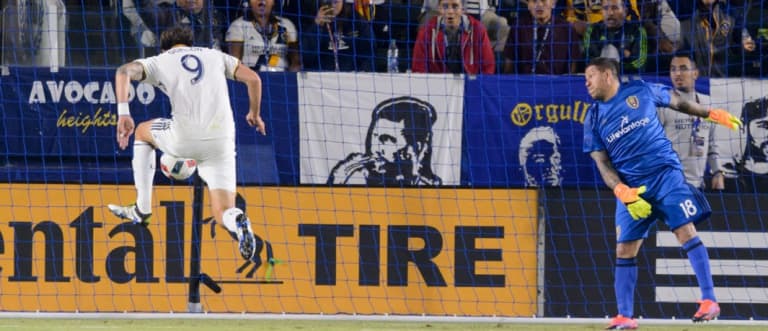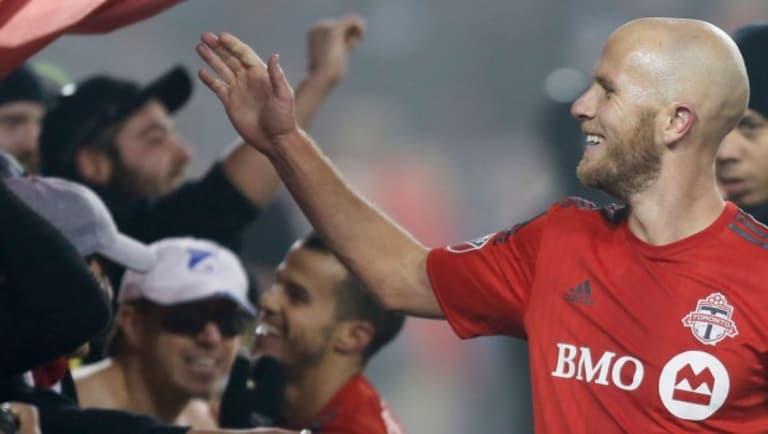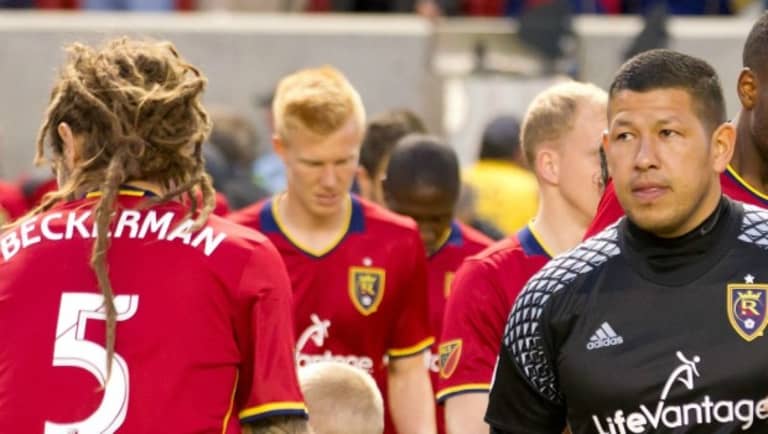Stop me if you’ve heard this one before: the LA Galaxy ought to be considered the favorites to advance out of the Western Conference bracket to MLS Cup.
In Bruce we trust. Race to seis. #LegenD. This is LA. It may be cliché, but it’s time to inch out onto an Audi 2016 MLS Cup Playoffs limb that I feel pretty confident is weight-bearing after Wednesday night’s casual 3-1 dispatching of Real Salt Lake in the Knockout Round.
Truthfully, though, I’d convinced myself LA were destined to shake off their regular-season “doldrums” long before jitterbug Emmanuel Boateng, who only the MLS uber-nerds among us were truly acquainted with before Wednesday evening, and Alan Gordon went out and shredded a lackadaisical RSL side facing a bit of an identity crisis (more on that later).
The reason, as always, is that head coach Bruce Arena has managed to, over the course of 10 months, build a squad with all the attributes of an MLS Cup champion. Difference makers in the final third. Up-and-comers with just enough experience to know what they’re doing – and just enough exuberance to ignore the stakes. A stable of veterans with plenty to prove and the mettle to manage the ups and downs of a two-leg playoff series.
And yes, I know Robbie Keane isn’t 100 percent and has been a shell of his former self since the beginning of August, and that Steven Gerrard’s hamstring struggles mean he’s unlikely to play a primary role in their Western Conference semifinal matchup against the Colorado Rapids. And yet, the Galaxy might actually be better off with their talisman relegated to a super-sub role and Gerrard riding the pine.

That’s a Arena team for you. When the game gives his team lemons, it feels like he was planning on making lemonade all along.
Sure, but there’s no denying that this was a substandard season in LA, you say. The Galaxy didn’t live up to their preseason billing. They dropped Nigel de Jong midseason. They don’t have a set lineup or obvious tactical identity. They’re dealing with injuries and age. They’re just not that good.
So what? LA may be imperfect, but then so is the rest of the playoff field.
This is also a team that lost just six times in 2016, tied with the Rapids for the fewest in MLS, collected more road points (20) than all but New York City FC and Toronto FC and had the second-best goal differential (+15) in the league. All without typical contributions from Keane and Gyasi Zardes, who could yet play in the playoffs. And that qualified as a disappointing season.
Not to mention that’s all in the past when Arena cares only for the future. What the Galaxy are now is a suddenly settled squad – Gordon at the point, Gio in his comfort zone, Landon “How did he get fit so quickly?” Donovan shutting down an entire flank, Sebastian Lletget and Baggio Husidic manning the engine room and Jelle Van Damme marshalling a backline with the second-best goals-against average in MLS – embarking on the only journey they cared about in the first place.
Next comes a cagey series against Colorado, a team of overachievers tasting the playoffs for the first time as a group and who must go to StubHub Center and avoid the same first-half deluge and second-half smothering that buried RSL. Can the Rapids do it? You bet, but when push comes to shove and regular-season results are rendered moot, who’s more likely to tap into the age-old playoff formula and grind out a win at home then shut it down on the road?
Put it this way, who would you bet your next paycheck on in a two-leg series? I’m taking the Galaxy, all the way to MLS Cup.
Finally, a taste of glory for Toronto
Admission time: I’m not an MLS lifer. I suspect most of us aren’t.
When I first acquired a taste for professional soccer and MLS in 2006, Toronto FC were just coming into existence, but I remember watching the Reds' inaugural year in 2007 from afar and thinking, “Boy, this is the sort of market that’s going to push the league forward. And quickly.”
TFC had a downtown, soccer-specific stadium, a young, vibrant, urban fanbase, the resources and ambition others lacked and a feeling of inevitability surrounding the club. On-field success was around the corner, it seemed, even if it hadn’t yet arrived in that first heady season.
Then year by year went by and Toronto remained, well, pretty terrible. If they weren’t completely inept, the Reds were pulling heart-breaking no-shows on the season’s final day as the playoffs remained a pipe dream for a fanbase desperate for a glimmer of hope, and some kind of reward for years of dedication spent waiting for the other shoe to drop.

Then came the Bloody Big Deal that brought Jermain Defoe and Michael Bradley to the Great White North, subsequent Jozy Altidore-for-Defoe swap, the transformative Sebastian Giovinco signing, a handful of wise, if understated, moves by GM Tim Bezbatchenko and a well-conceived makeover of BMO Field.
It all culminated on Wednesday night in the club’s first-ever playoff win in their first-ever playoff game at home against the Philadelphia Union. Finally, Toronto’s wait is over. The monkey is off their back. This is what professional soccer was supposed to look like in the Six: big crowds, big names, big results and big expectations.
The Reds have arrived, and I have a feeling they aren’t going anywhere anytime soon.
Soul-searching in SLC
What is Real Salt Lake’s identity? Who are the faces of the club?
Those are questions ownership and general manager Craig Waibel must ask themselves this offseason after an anticlimactic but unsurprising flameout in the Knockout Round. The answer, I suspect, will look quite a bit different than it has in the past.

This offseason is a pivotal point in RSL history. The players who built the club from bottom-feeder to arguably the league’s best team from 2009-14 have slowly departed, leaving Nick Rimando, Kyle Beckerman and Javier Morales to carry the banner.
But is the same recipe that got them here a viable mix for success in 2017 and beyond? That increasingly looks unlikely. I think it’s time to fully commit to the transition from a roster centered around the old guard – Rimando and Beckerman are signed through 2017 – to one led by Joao Plata, Yura Movsisyan and the young talent coming through the academy.
The inevitable follow-up question is whether head coach Jeff Cassar will be around to continue leading that transition. Cassar’s contract is up, and what direction the organization decides on with their head coach will be a glimpse into where they see their future heading.
Big questions in Chester
The Union can be satisfied with their 2016 campaign, but they’ve still got plenty of questions to answer this offseason. In no particular order…
- Can the club find a center forward to provide goal-scoring punch and competition for C.J. Sapong
- What is Alejandro Bedoya’s best position? Whether it’s box-to-box or attacking midfield, they’ll have holes to fill in the midfield with the departure of Tranquilo Barnetta and another long-term injury to the snake-bit Maurice Edu.
- Do they have enough firepower or depth on the wings to compete with the Eastern Conference elite?
- Are the Union willing to endure another year of potential growing pains along a young backline, or do they invest in an experienced central defender to lead the group?
- Will Andre Blake be in Philly in 2017 or has he done enough to pique the interest of a foreign club?
- What’s behind the late-season collapse that saw them limp into the final stretch, then bow out in the Knockout Round?
You better believe Earnie Stewart has been considering these questions and plenty more for quite some time. Now it’s time to dig in and find some answers.












